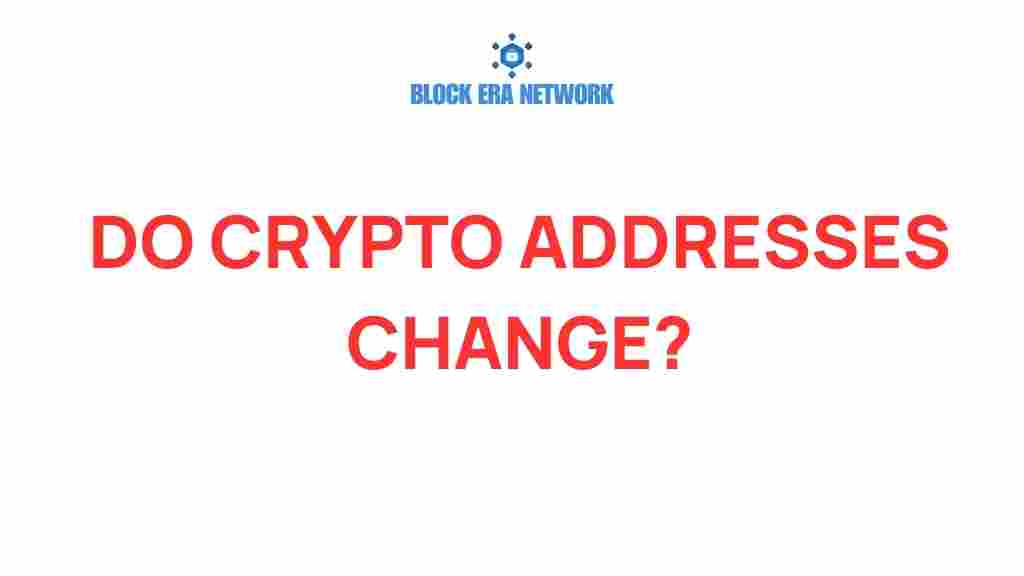Do Crypto Addresses Change? Understanding Crypto Addresses and Blockchain Identity
In the evolving landscape of cryptocurrency, one fundamental question arises: do crypto addresses change? This article aims to unravel the mystery behind crypto addresses and their role in blockchain identity, security, and privacy. With the rise of decentralized finance (DeFi) and digital wallets, understanding how crypto addresses function is crucial for anyone involved in cryptocurrency transactions.
What Are Crypto Addresses?
Crypto addresses are alphanumeric strings that serve as the destination for cryptocurrency transactions. Think of them as your bank account number in the digital currency world. Each address is unique to a specific wallet and can be used to send and receive various cryptocurrencies.
- Format: Crypto addresses come in different formats depending on the blockchain. For example, Bitcoin addresses start with a ‘1’, ‘3’, or ‘bc1’, while Ethereum addresses begin with ‘0x.
- Length: The length of crypto addresses varies; Bitcoin addresses typically contain 26-35 characters, while Ethereum addresses are 42 characters long.
Do Crypto Addresses Change?
The answer to whether crypto addresses change is both straightforward and nuanced. In general, crypto addresses can change, depending on how you manage your digital wallets. Here’s a breakdown:
- Static Addresses: Some wallets allow users to have static addresses, meaning the same address can be reused for multiple transactions. This approach, however, can compromise privacy.
- Dynamic Addresses: Many wallets generate a new address for each transaction. This enhances privacy and security by making it harder to track a user’s transaction history.
Implications for Blockchain Identity
Understanding whether crypto addresses change is crucial for maintaining blockchain identity. Here’s how it plays into broader themes of security and privacy:
- Security: Using dynamic addresses can protect users from hacks and unwanted surveillance by obscuring transaction patterns.
- Privacy: Since crypto transactions are recorded on a public ledger, using multiple addresses can help maintain user anonymity.
Managing Crypto Addresses in Digital Wallets
Effective wallet management is essential for the security of your cryptocurrency assets. Here are some tips on managing crypto addresses:
- Use a Reliable Wallet: Choose a reputable wallet that offers features like address generation and management. Hardware wallets are considered the most secure.
- Track Transactions: Keep a record of your transactions and the addresses used for sending and receiving crypto to avoid confusion.
- Regularly Update Your Wallet: Ensure your wallet software is up-to-date to protect against vulnerabilities.
Step-by-Step Process: How to Use Crypto Addresses Effectively
Follow this simple process to manage your crypto addresses effectively:
- Set Up Your Wallet: Choose a digital wallet that suits your needs (hardware, software, or online).
- Generate Your First Address: When you create your wallet, it will generate your first crypto address.
- Receive Cryptocurrency: Share your address with the sender to receive crypto.
- Send Cryptocurrency: When sending crypto, input the recipient’s address accurately to avoid loss of funds.
- Monitor and Manage Addresses: Keep track of the addresses you use for different transactions to enhance security and organization.
Transaction Tracking and Privacy Concerns
Transaction tracking can be both a benefit and a concern in the world of cryptocurrency. While blockchain technology allows for transparency, it can also lead to privacy issues:
- Public Ledger: All transactions are recorded on a public ledger, making it possible for anyone to view transaction histories associated with specific addresses.
- Analyzing Patterns: Advanced blockchain analysis tools can link transactions to individuals, potentially compromising privacy.
Troubleshooting Common Issues with Crypto Addresses
Even experienced users may encounter issues with crypto addresses. Here are some common problems and solutions:
- Incorrect Address Format: Always double-check the address format before sending. Different cryptocurrencies have different address formats.
- Transaction Delays: If a transaction is taking longer than expected, check the blockchain explorer for network congestion and transaction confirmation status.
- Lost Access to Wallet: If you lose access to your wallet, recovery can be difficult. Always back up your wallet and keep your recovery phrases secure.
Conclusion: The Importance of Understanding Crypto Addresses
In conclusion, understanding whether crypto addresses change is vital for anyone engaging with cryptocurrency. It has direct implications for blockchain identity, security, and privacy. As the cryptocurrency landscape continues to evolve, users must stay informed about best practices in wallet management, transaction tracking, and the importance of maintaining privacy.
By leveraging dynamic addresses and being cautious with your transactions, you can enhance your security in the world of decentralized finance. Stay educated, and you’ll navigate the complexities of crypto addresses with confidence.
For more information on cryptocurrency and blockchain technology, you can check out this detailed guide.
Do you have any thoughts or experiences regarding crypto addresses? Share your insights in the comments below!
This article is in the category Crypto Security and created by Block Era Network Team
